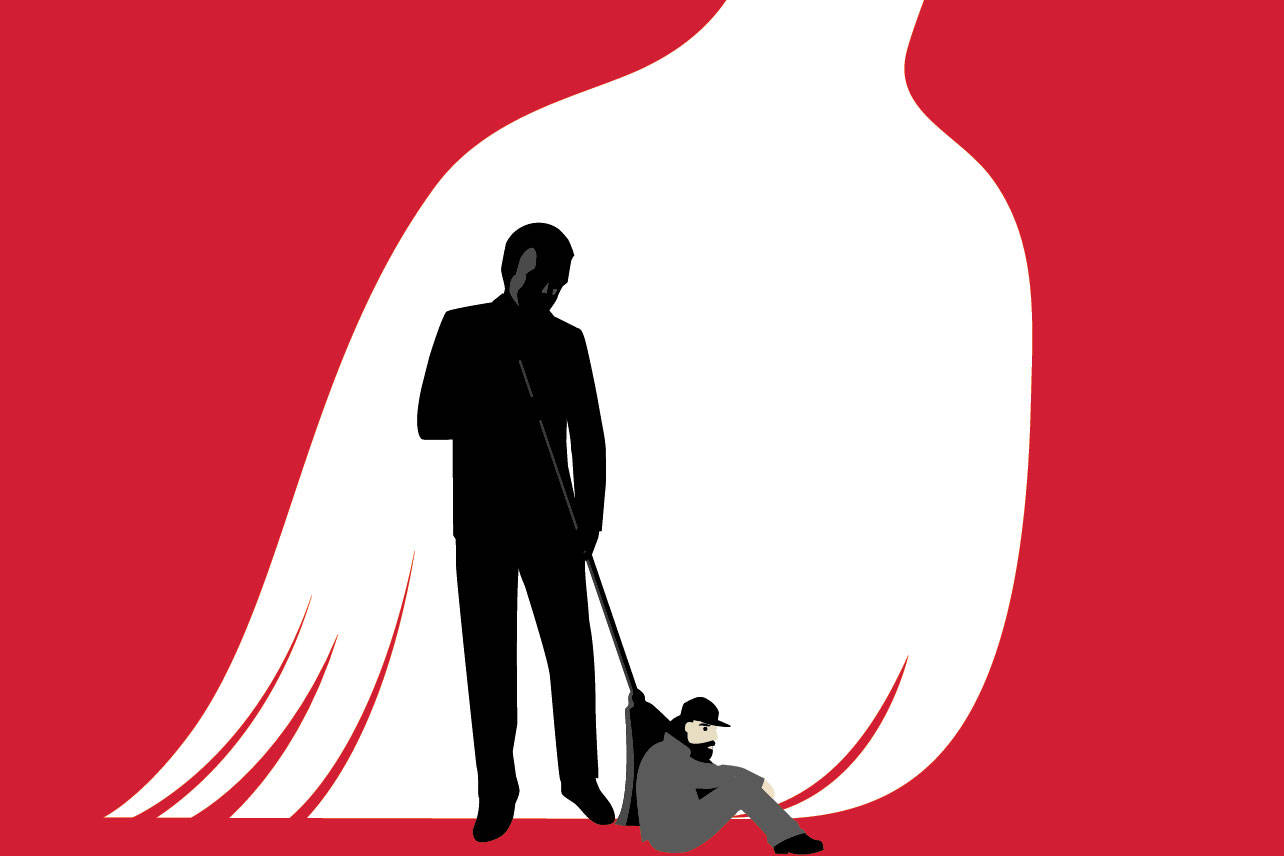In the early morning hours of March 10th, a vandal—or vandals—walked up to the Temple de Hirsch Sinai synagogue on Capitol Hill with a can of black spray paint and wrote, “HOLOCAUST IS FAKE HISTORY!” The S’s in the phrase were replaced with dollar signs.
It was an ugly and menacing desecration. Acts of anti-Semitism were on the rise across the country at the time, and people reasonably feared they were the outgrowth of a white nationalist movement in the United States emboldened by the election of President Donald Trump. As such, the act of vandalism drew quick and stern rebuke from city councilmembers and members of Congress alike, with U.S. Representative Pramila Jayapal standing on the steps of the Capitol demanding the Trump administration investigate it and other incidents as hate crimes. Within hours of the vandalism being discovered, it had been covered with a large sign that read “LOVE WINS.”
The vigilance against hate displayed in early March is heartening. Yet as events this weekend made clear, there are strains of anti-Semitism that run deeper than spray paint in Seattle, and to date, we as a community have failed to speak out against it with the moral clarity that Seattle prides itself on. Specifically, in the ongoing fight over displacement in the Central District, some community members have made Ian Eisenberg, owner of Uncle Ike’s Pot Shop at 23rd and Union, the focus of their ire. For a while, we at Seattle Weekly have heard reports that along with complaints leveled by activists about Uncle Ike’s close proximity to a church important to the local black community and aggressive advertising tactics employed by Eisenberg, a few actors have attacked Eisenberg outright for being Jewish. Those reports were undeniably confirmed over the weekend when Eisenberg posted a video of longtime Central District activist Omari Tahir-Garrett telling Eisenberg to “go back to Germany” in order to “let those Nazis get on you again.”
Eisenberg says he’s heard Tahir-Garrett say similar things before, just not on camera. But video evidence does suggest that it’s not isolated to Tahir-Garrett. In 2015, as PubliCola reported, an unidentified protester claimed that Eisenberg is a former member of the Israeli military. (He’s not.) In fact, Eisenberg grew up in the Central District, and the same racist housing policies that red-lined African Americans into the neighborhood often applied to Seattle’s Jewish population—a fact often glossed over in an attempt to make Eisenberg a symbol of Seattle gentrification.
These anti-Semitic remarks make up a tiny fraction of what’s been said at recent anti-gentrification protests in the Central District. By and large, the demonstrations have been peaceful and have focused on valid, important questions, chief among them whether a black community that for decades was terrorized by the War on Drugs is now getting victimized again by the financial bonanza that’s come with legal marijuana operations like Uncle Ike’s, which has sold, to date, $32.8 million in marijuana since opening in 2014. That’s a legitimate conversation, and one we should continue to have.
But we must also be willing to call out hate. However, since the video was posted, public response has been largely muted, especially when compared to the unity displayed after the vandalism of Temple de Hirsch Sinai. Tahir-Garrett himself has been silent on the matter, and some affiliated with him have said they condemn the remarks, even as they attempt to wrap them in context that somehow forgives them. In particular, Tahir-Garrett’s son, Wyking—also a prominent activist—suggested his father’s comments could be used as a productive conversation-starter in Seattle. “We do not wish for the horrific acts that First Nations, Africans and others have suffered to befall others,” he said in a written statement, conspicuously avoiding any direct mention of the historical facts of the Holocaust. “We hope that those who are offended by the video feel just as compelled (if not more so) to respond to the offensive actions that are the gentrification and displacement of Seattle’s African-American community from the Central District.”
While we must own up to the harm done to the people Wyking references, it doesn’t change the fact that his response is an evasion. Yet it is still more commendable than the complete silence from politicians who have spoken out against hate in less complicated circumstances. It’s easy to condemn a faceless vandal; less so a man who’s rightly earned respect for his efforts to defend the African-American community in Seattle. But to pick and choose what we rebuke is to equivocate on hate. If we are earnest in our desire to see racial justice prevail, we must be made of sterner stuff.
editorial@seattleweekly.com





